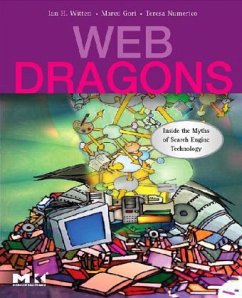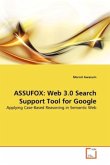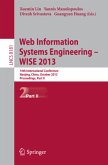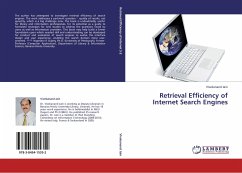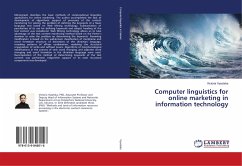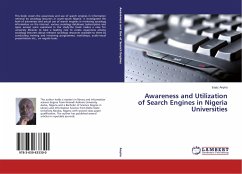Web Dragons offers a perspective on the world of Web search and the effects of search engines and information availability on the present and future world.
In the blink of an eye since the turn of the millennium, the lives of people who work with information have been utterly transformed. Everything we need to know is on the web. It's where we learn and play, shop and do business, keep up with old friends and meet new ones. Search engines make it possible for us to find the stuff we need to know. Search engines - web dragons - are the portals through which we access society's treasure trove of information. How do they stack up against librarians, the gatekeepers over centuries past? What role will libraries play in a world whose information is ruled by the web? How is the web organized? Who controls its contents, and how do they do it? How do search engines work? How can web visibility be exploited by those who want to sell us their wares? What's coming tomorrow, and can we influence it?
As we witness the dawn of a new era, this book shows readers what it will look like and how it will change their world. Whoever you are: if you care about information, this book will open your eyes and make you blink.
Presents a critical view of the idea of funneling information access through a small handful of gateways and the notion of a centralized index--and the problems that may cause Provides promising approaches for addressing the problems, such as the personalization of web services Presented by authorities in the field of digital libraries, web history, machine learning, and web and data mining Find more information at the author's site: webdragons.net
In the blink of an eye since the turn of the millennium, the lives of people who work with information have been utterly transformed. Everything we need to know is on the web. It's where we learn and play, shop and do business, keep up with old friends and meet new ones. Search engines make it possible for us to find the stuff we need to know. Search engines - web dragons - are the portals through which we access society's treasure trove of information. How do they stack up against librarians, the gatekeepers over centuries past? What role will libraries play in a world whose information is ruled by the web? How is the web organized? Who controls its contents, and how do they do it? How do search engines work? How can web visibility be exploited by those who want to sell us their wares? What's coming tomorrow, and can we influence it?
As we witness the dawn of a new era, this book shows readers what it will look like and how it will change their world. Whoever you are: if you care about information, this book will open your eyes and make you blink.
Presents a critical view of the idea of funneling information access through a small handful of gateways and the notion of a centralized index--and the problems that may cause Provides promising approaches for addressing the problems, such as the personalization of web services Presented by authorities in the field of digital libraries, web history, machine learning, and web and data mining Find more information at the author's site: webdragons.net
"It is not a resource on how search engines work, but rather what ideas and ideals have been realized in the development of search engines, the political and human challenges they face and problems and opportunities they present to humans and to the nature of knowledge and information. The book is written in a clear, simple fashion, making it accessible to all readers. The broad swath it cuts, however, does not detract from its use as an academic course resource." --Choice, June 2007
"If you've ever searched the web for information and wondered what's going on behind that query box, I recommend you read Web Dragons. It puts Internet search engines in context-part of a legacy of information access dating back thousands of years. It explains in plain language how search engines work, and points out potential pitfalls that thoughtful searchers should consider. Web Dragons is clear and engaging. Given the amount of time and trust we all invest in search engines, if you pay attention to the web I highly recommend redirecting some of that attention to this book." --Craig Nevill-Manning, Engineering Director, Google
"Search technology is changing the way people understand and interact with the world. Web Dragons takes a revealing look at the evolution of search and how it will shape the future of information technology." --Prabhakar Raghavan, Head of Yahoo! Research
"Witten, Gori and Numerico steadily bring the web into sharper and sharper focus. A daunting expanse is revealed to have structure. The structure enables the knowledgeable to navigate it to their benefit and allows the unscrupulous or careless to create pitfalls and traps. Search engines will be critical tools for most people living today. What could be more important than understanding how these technologies work and where they are going?" --Jonathan Grudin, Microsoft Research
"If you've ever searched the web for information and wondered what's going on behind that query box, I recommend you read Web Dragons. It puts Internet search engines in context-part of a legacy of information access dating back thousands of years. It explains in plain language how search engines work, and points out potential pitfalls that thoughtful searchers should consider. Web Dragons is clear and engaging. Given the amount of time and trust we all invest in search engines, if you pay attention to the web I highly recommend redirecting some of that attention to this book." --Craig Nevill-Manning, Engineering Director, Google
"Search technology is changing the way people understand and interact with the world. Web Dragons takes a revealing look at the evolution of search and how it will shape the future of information technology." --Prabhakar Raghavan, Head of Yahoo! Research
"Witten, Gori and Numerico steadily bring the web into sharper and sharper focus. A daunting expanse is revealed to have structure. The structure enables the knowledgeable to navigate it to their benefit and allows the unscrupulous or careless to create pitfalls and traps. Search engines will be critical tools for most people living today. What could be more important than understanding how these technologies work and where they are going?" --Jonathan Grudin, Microsoft Research

